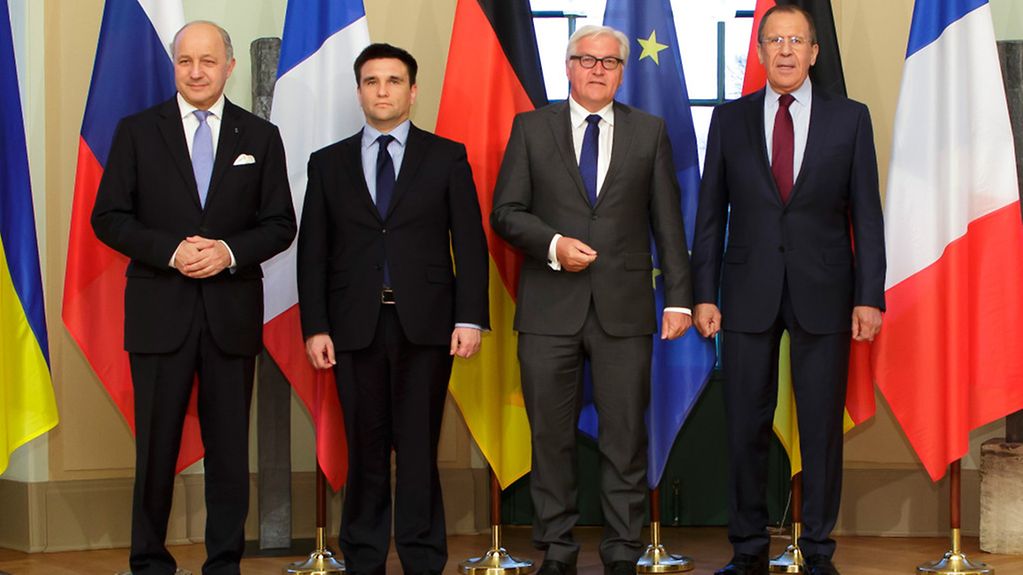Consultations on Ukraine
Federal Foreign Minister Frank-Walter Steinmeier has met for consultations with his counterparts from France, Ukraine and Russia regarding the implementation of the Minsk agreements. In spite of a certain lull, it is too early to "give the all clear" he said, speaking in Berlin.
3 min reading time

It was the fourth time that the Federal Foreign Minister had invited his counterparts to Berlin
Photo: photothek.net/Trutschel
Federal Foreign Minister Frank-Walter Steinmeier expressed his concern at developments over the last few days. Armed hostilities during the Orthodox Church’s Easter celebrations again resulted in loss of lives. The consultations in Berlin’s Villa Borsig aimed to get all sides to commit to upholding the ceasefire and to get the political process moving.
The four foreign affairs ministers of the Normandy Group expressed their concern for the peace process in a joint statement. They called on all parties to the conflict to work with the OSCE observer mission. They also agreed on specific measures including the withdrawal of additional categories of weapons and the appointment of OSCE working groups in four fields: humanitarian aid, security matters, the political process and economic reconstruction in eastern Ukraine.
Working groups for comprehensive regulations
For this reason the meeting in Berlin was also attended by the Special Representative of the OSCE Chair in Office, Ambassador Heidi Tagliavini. Frank-Walter Steinmeier explained that the working groups are to focus on the preparations for local elections in the areas occupied by the separatists, as agreed in the Minsk package of measures. The ministers also declared their wish to continue with the exchange of prisoners, "with the aim of exchanging all prisoners".
Frank-Walter Steinmeier spoke of the "long way" ahead for all parties involved. Access must be guaranteed to allow humanitarian aid into the area and the special status of the eastern Ukrainian Donbas region must be regulated. All these points were part of the agreements signed in September 2014 and in February 2015. The Federal Foreign Minister confirmed, "It is an arduous process. We, for our part, will do all we can to continue this process."
On 6 June 2014 Chancellor Angela Merkel met with Vladimir Putin, Petro Poroshenko and François Hollande on the fringes of the World War commemorations in Normandy. It was the first time the that heads of state of Russia and Ukraine had met since the outbreak of the crisis. Since then meetings involving these four nations have been dubbed "Normandy format" meetings.
Securing the ceasefire on all sides
The Minsk agreements are far more than just a ceasefire agreement, which is more or less upheld, stressed Federal Foreign Office spokesperson Martin Schäfer on Monday morning. If the situation is to be defused in the long term, much more is needed than only the withdrawal of heavy weapons, a ceasefire and the OSCE to monitor the first two measures. "The ceasefire is an essential precondition for de-escalation and all further steps – leading to a political solution in Ukraine," said the spokesperson.
Although military activities in eastern Ukraine have declined dramatically since February, said Martin Schäfer, the OSCE reports that hostilities around Mariupol and Donetsk Airport have "simply not ceased". The spokesperson stated that the German government will use all means at its disposal to "silence the weapons here too at last".
According to the reports of the OSCE observers it seems safe to assume that the "violations of the ceasefire are not being perpetrated by one side alone but that both sides of this military conflict are responsible for repeated violations, " admitted Martin Schäfer. The German government regrets this. On the basis of the ceasefire the first genuine steps towards a political solution are now needed, and a roadmap exists for this purpose.
Ambitious timescale
There are however difficulties about realising and respecting the ambitious schedule up to the end of 2015. "That is why it is good and correct in the view of the Federal Foreign Minister for the Normandy format governments to come together and keep the process going – ideally indeed to accelerate the process, " said Martin Schäfer. The priority goal is still to "get the working groups going under the aegis of the OSCE so that they can deal with the issues that are of burning importance to everybody".